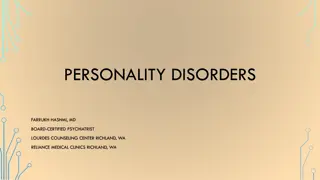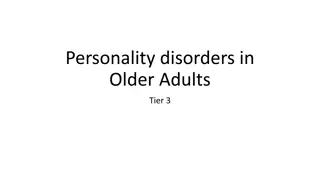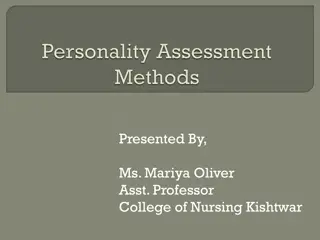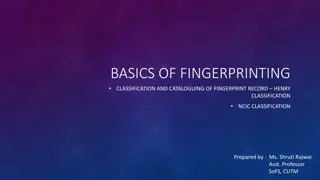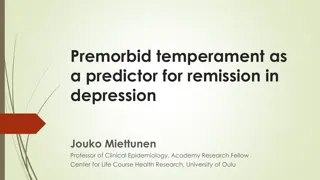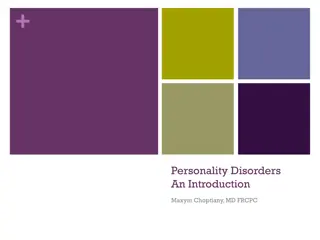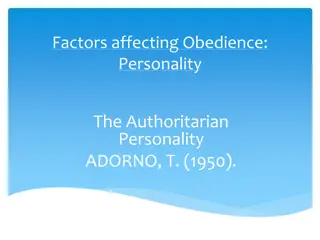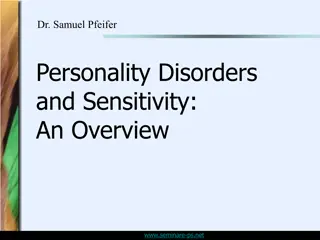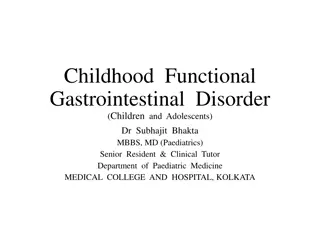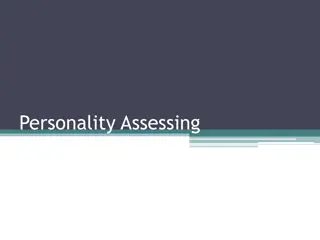Understanding Personality Disorders: A Comprehensive Overview and Classification
Dive into the world of personality disorders with this informative presentation by Professor Al-Sughayir. Explore the definition of personality, various types of disorders, traits, terminologies, and etiology. Gain insights into normal versus abnormal traits, functional impairments, and the role of biological and psycho-social factors in the development of personality disorders.
Download Presentation

Please find below an Image/Link to download the presentation.
The content on the website is provided AS IS for your information and personal use only. It may not be sold, licensed, or shared on other websites without obtaining consent from the author. Download presentation by click this link. If you encounter any issues during the download, it is possible that the publisher has removed the file from their server.
E N D
Presentation Transcript
1 http://t0.gstatic.com/images?q=tbn:ANd9GcRQ1K-vYkNuvqPAA0oQDIkN4BgtTNVUxvjJmmCws9or0gcYQfSad8p5TFmZwg Personality Disorders Course 462 PME 4thyear College of Medicine Mohammed Al-Sughayir Professor, Psychiatry Department, College of Medicine, KSU, KSA
2 Objectives At the end of this lecture, student should be able to 1. Know the terms related to personality. 2. Understand the concept of personality & its disorders. 3. Know the various types of personality disorders. 4. Be able to detect personality disorders & act accordingly. What is personality? Personality Disorders- Prof. Al-Sughayir
3 What is personality? Self- confidence Thinking & Core Beliefs Motives & self-control Emotions Judgment Moral standards Distinctive Stress adaptation Behavior Relationships Others Ingrained/habitual Enduring Not situational Personality Disorders- Prof. Al-Sughayir
4 Terminology Personality: The distinctive set of traits that defines the individual s interaction with himself (intrapersonal), others (interpersonal), and life. Trait: A prominent enduring aspect and qualities of a person (range not a point e.g. trust) Character: A trait that represents adherence to the social values and moral standards. Temperament: A trait before the age at which the personality is well formed 18 years. (children and adolescents characteristics/mood-related/biological constitutions). Personality Disorders- Prof. Al-Sughayir
5 Is a trait a point or a range? E.G, TRUSTING OTHERS E.G, PERFECTIONISM
6 Personality Normal Abnormal traits Traits: some abnormal traits but not enough to fulfil the criteria of any personality disorder. Personality Disorder Traits: enough abnormal traits. Traits: within the acceptable range. Significant functional impairment due to traits. No functional impairment due to traits. Significant intra/interpersonal suffering due to traits. Age > 18 years. No intra/interpersonal suffering due to traits. Exclusion of primary causes (TBI/medical E.g., Paranoid traits, Obsessional traits. Wide range of variation of normal personality. E.g., MBTI 16 types. diseases/medications/substance abuse ). Lifelong not situational. E.g., Paranoid PD, BPD, OCPD. Personality Disorders- Prof. Al-Sughayir
7 Etiology of personality disorders No specific etiology. Determinants of Personality and its Disorders Biological factors (genetics/brain structure & functions/ NTs). Psycho-social (upbringing, cultural values & rules, ) Personality Disorders- Prof. Al-Sughayir
8 Types DSM classifies the personality disorders into three clusters based on similarities in symptoms, traits, and defense mechanisms involved. Cluster DSM Paranoid - Schizoid - Schizotypal A: Eccentric thinking with ++idea of reference Borderline - Histrionic (Emotions+++/Control------) Narcissistic - Antisocial (Emotions---/Control++++) B: Emotions toward others (interpersonal problems) C: Emotions toward self (intrapersonal problems) Avoidant - Dependent - Obsessive compulsive Personality Disorders- Prof. Al-Sughayir
9 Avoid premature Dx.
10 Paranoid Personality Disorder ) ) Excessive exaggeration Mistrust & suspiciousness of others including relatives & friends/idea of reference. Secrecy. Denial & projection of faults onto others. Sensitivity to offenses & counterattacking and reacting angrily with abusive behavior. Bearing of grudges/insults persistently. Argumentation/stubbornness. DDx: other personality disorders and psychotic disorders. Patient concern: Exploitation and betrayal. Approach: Acknowledge complaints without arguing and honestly explain medical illness. Treatment: Psychotherapy + Antipsychotics (e.g. olanzapine 5 mg). Personality Disorders- Prof. Al-Sughayir
http://t2.gstatic.com/images?q=tbn:ANd9GcTd22xKWTug4kLJuCxk5_7tZ9wpNC8X5x3LTKt5eRX_IqsTXswShttp://t2.gstatic.com/images?q=tbn:ANd9GcTd22xKWTug4kLJuCxk5_7tZ9wpNC8X5x3LTKt5eRX_IqsTXswS 11 Schizoid Personality Disorder ) ( DDx: Avoidant PD-Paranoid PD- Schizotypal PD Very limited social interactions/skills with self-sufficiency (not to avoid criticism). Indifference to criticism/praise. Preference of solitary activities and jobs. Patient concern: Violations of privacy. Approach: Accept his unsociability and need for privacy. Reduce the patient's isolation as tolerated. Treatment: Psychotherapy + Antipsychotics (e.g. olanzapine 5 mg). Personality Disorders- Prof. Al-Sughayir
12 Schizotypal Personality Disorder ) ) DDx: Schizoid PD, Paranoid PD, & schizophrenia. Odd patterns of thoughts, Patient concern: Exploration of oddities. imaginations, perception, feelings, Approach: Empathize with the patient's oddities without confrontation. appearance & behavior. Treatment: Psychotherapy + Antipsychotics (e.g. olanzapine 5 mg). Excessive unusual perceptual experiences (e.g. bodily illusions), superstitious thinking, and idea of reference. Personality Disorders- Prof. Al-Sughayir
14 Types DSM classifies the personality disorders into three clusters based on similarities in symptoms, traits, and defense mechanisms involved. Cluster DSM Paranoid - Schizoid - Schizotypal A: Eccentric thinking with ++idea of reference Borderline - Histrionic (Emotions+++/Control------) Narcissistic - Antisocial (Emotions---/Control++++) B: Emotions toward others (interpersonal problems) C: Emotions toward self (intrapersonal problems) Avoidant - Dependent - Obsessive compulsive Personality Disorders- Prof. Al-Sughayir
15 Borderline Personality Disorder ) ( Sense of identity is unstable (changing to extremes). Chronic feelings of deep inner emptiness. Mood is very unstable + tendency to intense extreme emotions (anger/hatred/ jealousy/love). Behavior is unstable + impulsive/destructive potentially self-damaging behavior (e.g., self-injury/suicidal behavior). Relationships are unstable (intense/changing). Efforts to avoid abandonment. DDx: other personality disorders and psychotic disorders(esp. bipolar mood disorders). Patient concern: Abandonment & loss of support. Approach: Empathize and set limits. Use logic thinking to counteract an emotional style of relationship. Treatment: Psychotherapy + mood stabilizers, SSRIs, Antipsychotics. Personality Disorders- Prof. Al-Sughayir
16 Histrionic Personality Disorder ( ) Excessive attention seeking behavior DDx: 1. BPD. 2. Narcissistic personality disorder. 3. Somatoform disorders (may co-exist) (verbal and nonverbal). Patient concern: Loss of recognition/love. Self dramatization and exaggeration. Approach: Set limits and avoid being too warm. Use logic thinking to counteract an emotional style of relationship. Provocative and seductive behavior. Suggestibility with superficial thinking. Treatment: Directive psychotherapy to increase awareness of the real feelings underneath the behavior. Pharmacological treatment: antianxiety or antidepressant drugs may transiently be used. Excessive superficial emotions (shallow and shifting). Personality Disorders- Prof. Al-Sughayir
17 Narcissistic Personality Disorder ( ) Exaggerated sense of superiority & priority. DDx: other personality disorders and psychotic disorders. Constant seeking of admiration (not only attention/meetings, social media, ) Coping style: Idealizing self with self-inflation to protect & augment self-esteem. Preoccupation with success for entitlement. Patient concern: Devaluation and loss of prestige. Excessive and unrealistic ambitions. Excessive concern about appearance more than truth & essence. Approach: Avoid confronting his self-inflation. Treatment: Rarely seek or accept treatment. Episodes of Exploitative, envious, and lacks empathy. anxiety or depression can be treated symptomatically. Fragile self-esteem when defeated. Personality Disorders- Prof. Al-Sughayir
18 Antisocial Personality Disorder ) ( DDx: other personality disorders and psychotic disorders. Lack of remorse, guilt, shame, & Patient concern: Exploitation and loss of self-esteem. loyalty. Approach: Verify symptoms & discover malingering. Control wish to punish patient. Explain that deception results in patient poor care. Violation of rules (lying, dishonest, deceptive, and exploiting). Failure to learn from experience. Treatment: Treatment of substance abuse often effectively reduces antisocial attitude and tendency. Long-term hospitalization is sometimes effective + group therapy. Impulsive toward desires/little concern about consequences. Consistent irresponsibility. Tendency to violence. Personality Disorders- Prof. Al-Sughayir
20 Types DSM classifies the personality disorders into three clusters based on similarities in symptoms, traits, and defense mechanisms involved. Cluster DSM Paranoid - Schizoid - Schizotypal A: Eccentric thinking with ++idea of reference Borderline - Histrionic (Emotions+++/Control------) Narcissistic - Antisocial (Emotions---/Control++++) B: Emotions toward others (interpersonal problems) C: Emotions toward self (intrapersonal problems) Avoidant - Dependent - Obsessive compulsive Personality Disorders- Prof. Al-Sughayir
21 Avoidant Personality Disorder ) ( DDx: Schizoid PD. / Dependent PD. Social phobia (may coexist) Sensitivity to criticism and rejection. Fearfulness of disapproval. Patient concern: Exploration of low self-esteem, inadequacy shame, and rejection. Timidity and shyness. Feelings of inadequacy in new Approach: Empathize, support self-esteem, and encourage assertiveness. Treatment: Psychological treatment: posting self- confidence and self-acceptance, assertiveness training social skills, and group therapy. Pharmacological treatment to manage anxiety or depression when present. situation. Reluctance to take personal risks. Very restricted number of friends. Personality Disorders- Prof. Al-Sughayir
22 Dependent Personality Disorder ) ( DDx: Avoidant personality disorder. Fear of separation/abandonment. Agoraphobia (may co-exist). Excessive compliance with others. Lack of self-reliance and self- Patient concern: Independence confidence. Approach: Explore why independence is so frightening and Submissive and clinging behavior. encourage independence and assertiveness. Excessive demands for reassurance Treatment: Psychological treatment: behavior therapy and and advice. insight oriented therapy. Pharmacological treatment: for Excessive worries about Difficulty in specific symptoms e.g. anxiety agoraphobia initiating tasks. Personality Disorders- Prof. Al-Sughayir
23 Obsessive Compulsive Personality Disorder OCPD- ) ( DDx: Narcissistic PD. (patient seeks perfectionism and more likely to believe that he has achieved it). OCD: presence of obsessions / compulsions (However, both can coexistence may occur). Excessive perfectionism interfering with achievement very idealistic views. Preoccupation with minor unnecessary details. Inflexibility and rigidity. Indecisiveness and hesitation Excessive self-blame and guilt feeling. Scrupulousness about issues of morality. Excessive devotion of time and energy to work, at the expense of social life. Reluctance in delegating tasks to others. Patient concern: Imperfection and guilt. Approach: Tolerate the patient's critical judgments and unnecessary details. Beware of his controlling behavior. Treatment: Psychological: supportive and directive individual or group therapy Pharmacological: SSRI or clomipramine. Personality Disorders- Prof. Al-Sughayir





